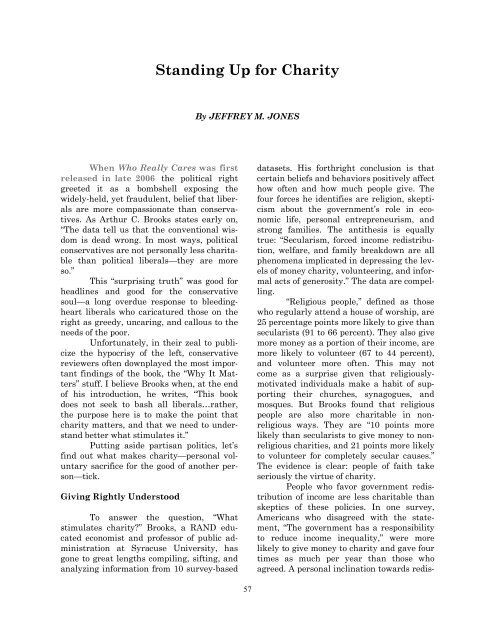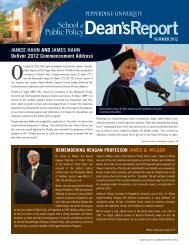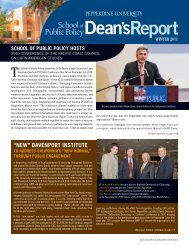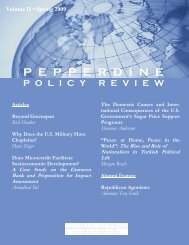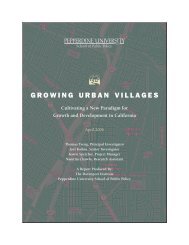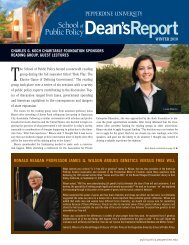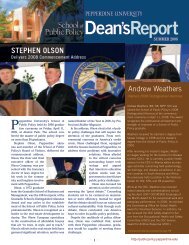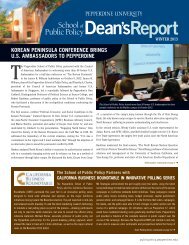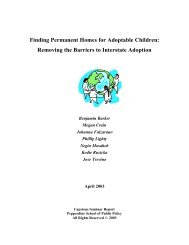Pepperdine University School of Public Policy
Pepperdine University School of Public Policy
Pepperdine University School of Public Policy
You also want an ePaper? Increase the reach of your titles
YUMPU automatically turns print PDFs into web optimized ePapers that Google loves.
Standing Up for Charity<br />
By JEFFREY M. JONES<br />
When Who Really Cares was first<br />
released in late 2006 the political right<br />
greeted it as a bombshell exposing the<br />
widely-held, yet fraudulent, belief that liberals<br />
are more compassionate than conservatives.<br />
As Arthur C. Brooks states early on,<br />
“The data tell us that the conventional wisdom<br />
is dead wrong. In most ways, political<br />
conservatives are not personally less charitable<br />
than political liberals—they are more<br />
so.”<br />
This “surprising truth” was good for<br />
headlines and good for the conservative<br />
soul—a long overdue response to bleedingheart<br />
liberals who caricatured those on the<br />
right as greedy, uncaring, and callous to the<br />
needs <strong>of</strong> the poor.<br />
Unfortunately, in their zeal to publicize<br />
the hypocrisy <strong>of</strong> the left, conservative<br />
reviewers <strong>of</strong>ten downplayed the most important<br />
findings <strong>of</strong> the book, the “Why It Matters”<br />
stuff. I believe Brooks when, at the end<br />
<strong>of</strong> his introduction, he writes, “This book<br />
does not seek to bash all liberals…rather,<br />
the purpose here is to make the point that<br />
charity matters, and that we need to understand<br />
better what stimulates it.”<br />
Putting aside partisan politics, let’s<br />
find out what makes charity—personal voluntary<br />
sacrifice for the good <strong>of</strong> another person—tick.<br />
Giving Rightly Understood<br />
To answer the question, “What<br />
stimulates charity?” Brooks, a RAND educated<br />
economist and pr<strong>of</strong>essor <strong>of</strong> public administration<br />
at Syracuse <strong>University</strong>, has<br />
gone to great lengths compiling, sifting, and<br />
analyzing information from 10 survey-based<br />
datasets. His forthright conclusion is that<br />
certain beliefs and behaviors positively affect<br />
how <strong>of</strong>ten and how much people give. The<br />
four forces he identifies are religion, skepticism<br />
about the government’s role in economic<br />
life, personal entrepreneurism, and<br />
strong families. The antithesis is equally<br />
true: “Secularism, forced income redistribution,<br />
welfare, and family breakdown are all<br />
phenomena implicated in depressing the levels<br />
<strong>of</strong> money charity, volunteering, and informal<br />
acts <strong>of</strong> generosity.” The data are compelling.<br />
“Religious people,” defined as those<br />
who regularly attend a house <strong>of</strong> worship, are<br />
25 percentage points more likely to give than<br />
secularists (91 to 66 percent). They also give<br />
more money as a portion <strong>of</strong> their income, are<br />
more likely to volunteer (67 to 44 percent),<br />
and volunteer more <strong>of</strong>ten. This may not<br />
come as a surprise given that religiouslymotivated<br />
individuals make a habit <strong>of</strong> supporting<br />
their churches, synagogues, and<br />
mosques. But Brooks found that religious<br />
people are also more charitable in nonreligious<br />
ways. They are “10 points more<br />
likely than secularists to give money to nonreligious<br />
charities, and 21 points more likely<br />
to volunteer for completely secular causes.”<br />
The evidence is clear: people <strong>of</strong> faith take<br />
seriously the virtue <strong>of</strong> charity.<br />
People who favor government redistribution<br />
<strong>of</strong> income are less charitable than<br />
skeptics <strong>of</strong> these policies. In one survey,<br />
Americans who disagreed with the statement,<br />
“The government has a responsibility<br />
to reduce income inequality,” were more<br />
likely to give money to charity and gave four<br />
times as much per year than those who<br />
agreed. A personal inclination towards redis-<br />
57


